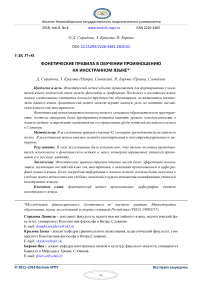“Phonics generalizations” in teaching foreign language pronunciation
Автор: Soradova Daniela, Kralova Zdena, Birova Jana
Журнал: Science for Education Today @sciforedu
Рубрика: Педагогика и психология
Статья в выпуске: 4 (44), 2018 года.
Бесплатный доступ
Introduction. The Phonics method is commonly applied to teach the logical association of English phonemes and graphemes to young native learners. As the correspondence between pronunciation and spelling in English is considered rather difficult by non-native learners, the Phonics method could find its important place in foreign language classrooms as well. The Phonics method is rather new in the Slovak educational context. Therefore, we wanted to find out what is the Phonics method awareness and application rate among English language teachers in Slovakia. Materials and Methods. To answer the research questions, the methods of questionnaire and semi-structured interview were used in the sample of 92 Slovak teachers of English. Results. It was found out that only half of the teachers know the Phonics method and less than a quarter of teachers apply it in their English classes. Conclusions. As the Phonics method rules (Phonics Generalizations) can help non-native learners learn English pronunciation and spelling more effectively, more information on the method should be incorporated into both pre-service and in-service teacher training curricula.
Phonics method, pronunciation, spelling, foreign language teachers
Короткий адрес: https://sciup.org/147229366
IDR: 147229366 | DOI: 10.15293/2226-3365.1804.03
Список литературы “Phonics generalizations” in teaching foreign language pronunciation
- Lojova G. Humanizing English language teaching in Slovakia // XLinguae. - 2016. - Vol. 9 (4). - P. 30-36. DOI: 10.18355/XL.2016.09.04.30-36
- Zhetpisbayeva B. A., Shelestova T. Y., Akbayeva G. N., Kubeyeva A. E., Tleuzhanova G. K. Problems of English language implementation into primary schools for multilingual education development in the Republic of Kazakhstan // Novosibirsk State Pedagogical University Bulletin. - 2016. - № 4. - P. 59-72. DOI: 10.15293/2226-3365.1604.06
- Kralova Z. Factors of English phonic competence. - Zilina: EDIS, 2009. - 74 p.
- Rizekova I. Position of transversal competencies in university settings // Xlinguae. - 2015. - Vol. 8, № 4. - P. 31-45. DOI: 10.18355/XL.2015.08.04.31-45
- Kralova Z. Slovak-English Phonic Interference. - Zilina: EDIS, 2011. - 101 p. (In Slovak)
- Birova J., Andrejcakova M. La compétence phonologique en francais chez les locuteurs slovaques: Aspects linguistiques et méthodes pédagogiques. - Paris: OEP, 2010. - 160 p.
- Kralova Z. Qualitative approximation in the system of Slovak and English short vowels. - Usti nad Labem, UJEP, 2010. (In Slovak)
- Donoghue R., Mildred R. Foreign languages and the elementary school child. - USA: Wm. C. Brown Company Publishers, 1968. https://books.google.ru/books/about/Foreign_languages _and_the_elementary_sch.html?id=ebQ0AAAAMAAJ&redir_esc=y&hl=ru&output=html_text
- Kralova Z. Classification of factors of foreign language phonic competence // XLinguae. - 2016. - Vol. 9 (4). - P. 92-99.
- DOI: 10.18355/XL.2016.09.04.92-99
- Kollarova D. The importance of rhythmics in the process of elementary literacy acquiring [Vyznam rytmiky pri nadobudani elementarnej gramotnosti] // Slavonic Pedagogical Studies Journal. - 2017. - Vol. 6 (1). - P. 178-191.
- DOI: 10.18355/PG.2017.6.1.14
- Kurucova Z., Stehlikova B., Tirpakova A. Verification of the efficiency of combined teaching of English // Information bulletin of the Czech statistical society. - 2012. - Vol. 23. - P. 60-68. URL: http://www.statspol.cz/bulletiny/ib-2012-4-web.pdf
- Cohen L., Manion L., Morrison K. Research Methods in Education. - 6th ed. - New York: Routledge, 2007. http://research-srttu.wikispaces.com/file/view/Research Methods in Education_ertu.pdf
- Soradova D. Teaching EFL through popular English songs // Teaching together, Learning together = English Language Teaching Ideas. - Nitra: UKF, 2016. - P. 86-90. http://www.klis.pf.ukf.sk/dokumenty/Publikacie/Zborník_SKA 2016_final.pdf
- Shustrova E. V., Checkletsova E. I., Volkova L. E., Luzjanina T. V. Teaching English by means of comic multimodal texts // XLinguae. - 2017. - Vol. 10 (4). - P. 34-47.
- DOI: 10.18355/XL.2017.10.04.04
- Kralova Z., Soradova D. Foreign Language Learning Anxiety // Teaching Foreign Languages to Learners with Special Educational Needs: e-textbook for Foreign Language Teachers. - Nitra: UKF in Nitra, 2015. - P. 91-100.
- DOI: 10.17846/SEN.2015.91-100
- McArthur G., Castles A., Kohnen S., Larsen L., Jones K., Anandakumar T., Banales E. Sight word and phonics training in children with dyslexia // Journal of Learning Disabilities. - 2015. - Vol. 48 (4). - P. 391-407.
- DOI: 10.1177/0022219413504996
- Skrinda A. Raising an awareness of an individual in teaching English as a foreign language // XLinguae. - 2017. - Vol. 10 (4). - P. 336-344.
- DOI: 10.18355/XL.2017.10.04.27
- Council of Europe. Common European Framework of Reference for Languages: Learning, Teaching, Assessment. Cambridge, Press Syndicate of the University of Cambridge, 2001. URL: https://www.coe.int/t/dg4/linguistic/source/framework_en.pdf
- Messer L. What is Phonics Learning, 2010. URL: http://ezinearticles.com/?What-Is-Phonics-Learning?&id=5619825
- Linguistic Phonics: Suggested Line of Progression and Word Bank for Primary Schools, 2009. URL: http://www.seelb.org.uk
- Finnie R. Introduction to Onestop Phonics, 2015. URL: http://www.onestopenglish.com/children/onestop-phonics/introduction-to-onestop-phonics/#comments
- Mala E. Teaching foreign languages at an alternative primary school. MEDACTA´91. Nitra, VŠPg, 1991, pp. 244-250.
- Piaget J., Inheldderova, B. Psychology of a child. Praha, SPN, 1970. (In Czech).
- Soradova D. Making English pronunciation and spelling logical for students with specific learning differences. Languages for Specific Purposes in Higher Education: Current Trends, Approaches and Issues. Brno, University of Technology, 2017. http://www.kj.fme.vutbr.cz/lspct/?pg=vyzva
- Lengyelfalusy T. Several questions about the teacher-learner relationship. Proceedings of the 18th International Colloquium on the Management of Educational Process. Vyskov, VVS PV, 2000.


